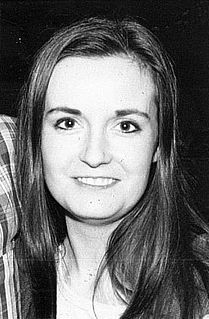A Quote by Lucy Larcom
Tailor's work--the finishing of men's outside garments--was the "trade" learned most frequently by women in [the 1820s and 1830s],and one or more of my older sisters worked at it; I think it must have been at home, for I somehow or somewhere got the idea, while I was a small child, that the chief end of woman was to make clothing for mankind.
Related Quotes
Our goal in the '70s was to end the closed door era. There were so many things that were off limits to women, policing, firefighting, mining, piloting planes. And the stereotypical view of people of a world divided between home and child caring women and men as breadwinners, men representing the family outside the home.
We've learned that women can and should do 'men's jobs,' for instance, and we've won the principle (if not the fact) of getting equal pay. But we haven't yet established the principle (much less the fact) that men can and should do 'women's jobs': that homemaking and child-rearing are as much a man's responsibility, too, and that those jobs in which women are concentrated outside the home would probably be better paid if more men became secretaries, file clerks, and nurses, too.
The Great Truth is that women in our society constitute one of the most privileged and powerful classes of human beings on earth. The challenge is to make women believe in their power. "Woman as victim" is an idea whose time has passed. The idea of woman as a survivor and a success must take its place.
I suppose the most important thing, the heaviest single factor in one's life, is whether one's born male or female. In most societies it determines one's expectations, activities, outlook, ethics, manners - almost everything. Vocabulary. Semiotic usages. Clothing. Even food. Women... women tend to eat less... It's extremely hard to separate the innate differences from the learned ones. Even where women participate equally with men in the society, they still after all do all the childbearing, and so most of the child-rearing.
I think, as a woman, in your thirties, it's the best time. Women in their thirties are really beautiful. They are. I think that it's hard for people to love women when they get older. But it's easy for them to love men. Men have always been able to age and be perceived as more handsome. But really, we're no different; we age exactly the same.
Men's clothing is more pure in design. It's more simple and has no decoration. Women want that. When I started designing, I wanted to make men's clothes for women. But there were no buyers for it. Now there are. I always wonder who decided that there should be a difference in the clothes of men and women. Perhaps men decided this.
I've got two older sisters, which I think was the best thing, but also the worst thing. They dressed me up like a girl, but at the same time I think they taught me a lot of what they experienced and what they lived through, and passed that on to me as a young man and influenced how I approached not only women, but people. I got very lucky with the family I was born into. From my older sisters to my mother and father, they're just good, kind-hearted people.
What if not just women, but both men and women, worked smart, more flexible schedules? What if the workplace itself was more fluid than the rigid and narrow ladder to success of the ideal worker? And what if both men and women became responsible for raising children and managing the home, sharing work, love, and play? Could everyone then live whole lives?
The whole world population rests on women. You have to start with the woman. And the woman will make her own decisions. If you want to have five or ten children, fine. You can have big families or small families, but you have the family you feel you can afford or feed. In China the one - child policy is already finished - on its way out because the economic conditions end up producing the same effect. If people want an expensive flat in a place like Shanghai, you can't have more than one child or two.







































